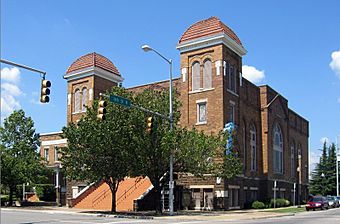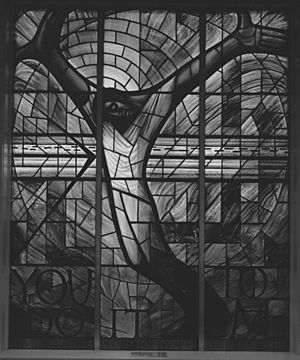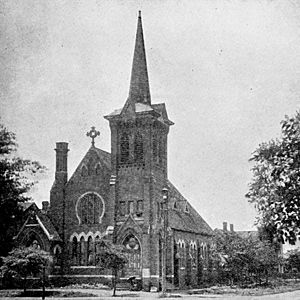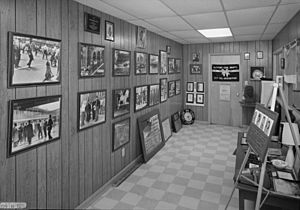16th Street Baptist Church facts for kids
|
16th Street Baptist Church
|
|

16th Street Baptist Church in 2005
|
|
| Location | Birmingham, Alabama |
|---|---|
| Built | 1911 / 1873 |
| Architect | Wallace Rayfield; Windham Bros. Construction Co. |
| Architectural style | Romanesque |
| NRHP reference No. | 80000696 |
Quick facts for kids Significant dates |
|
| Added to NRHP | September 17, 1980 |
| Designated NHL | February 20, 2006 |
The 16th Street Baptist Church is a Baptist church located in Birmingham, Alabama. It is a very important place in American history. In 1963, during the Civil Rights Movement, the church was bombed by members of the Ku Klux Klan. This terrible event killed four young girls.
Even after the bombing, the church continued to operate. Today, it is a key landmark in the Birmingham Civil Rights District. It was named a National Historic Landmark in 2006. Since 2008, it has also been considered for the UNESCO list of World Heritage Sites.
The Church's Early Days
The 16th Street Baptist Church started in 1873. It was first called the First Colored Baptist Church of Birmingham. This was the very first Black church to be formed in Birmingham. The city itself was only founded two years before.
At first, meetings were held in a small building. Later, the church bought land and built a new church. In 1880, they sold that property. They then built another new church at the current location on 16th Street. This brick building was finished in 1884.
However, in 1908, the city said the building was unsafe. It had to be torn down. The church then built the current building. It was designed by a famous Black architect named Wallace Rayfield. The new church was finished in 1911. It cost $26,000 to build.
Besides the main worship area, the church has a basement auditorium. This space was used for meetings and talks. There were also rooms for Sunday school classes. As a major center for the Black community, the church welcomed many important guests. Famous people like W. E. B. Du Bois and Paul Robeson spoke there.
The Civil Rights Era and the 1963 Bombing

During the Civil Rights Movement in the 1960s, the 16th Street Baptist Church became a very important place. It was a meeting spot for African Americans. They gathered there to protest against unfair treatment and racism in Birmingham. Leaders like Fred Shuttlesworth and Martin Luther King Jr. often spoke at the church. They helped organize peaceful protests.
On Sunday, September 15, 1963, a terrible event happened. Members of the Ku Klux Klan placed dynamite outside the church basement. At 10:22 AM, the bombs exploded. Four young girls were killed: Addie Mae Collins, Carole Robertson, Cynthia Wesley, and Denise McNair. They were getting ready for "Youth Day" at the church. Twenty-two other people were hurt.
This bombing was one of many attacks in the area. The neighborhood was even called "Dynamite Hill." The bombing of the 16th Street Baptist Church shocked the nation. It led to more involvement from the US government in Alabama. The next year, President Johnson signed the Civil Rights Act of 1964. This law made it illegal to treat people unfairly because of their race. In 1965, the Voting Rights Act of 1965 was passed. This law made sure all citizens could vote.
After the bombing, people from all over sent money to help the church. Over $300,000 was donated. Repairs began right away. The church reopened on June 7, 1964. The people of Wales even donated a beautiful stained glass window. It shows a Black Jesus and was designed by John Petts.
The Church Today
The 16th Street Baptist Church is recognized as a historic site. It was added to the Alabama Register of Landmarks and Heritage in 1976. In 1980, it was added to the National Register of Historic Places. Because of its national importance in the Civil Rights Movement, it became a National Historic Landmark in 2006. The US government has also suggested it for the UNESCO list of World Heritage Sites.
Today, the church is part of the Birmingham Civil Rights District. More than 200,000 visitors come to the church each year. Even though its regular membership is about 500 people, nearly 2,000 attend weekly services. The current pastor is Reverend Arthur Price.
Across from the church is Kelly Ingram Park and the Birmingham Civil Rights Institute. These places help teach people about human rights and the history of the Civil Rights Movement. In the early 2000s, the church underwent a $3 million restoration. This work fixed water damage and repaired the outside brick.
 | John T. Biggers |
 | Thomas Blackshear |
 | Mark Bradford |
 | Beverly Buchanan |




